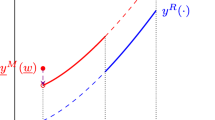Summary.
A group of individuals meet to share the cost and determine output allocations of a partial-excludable public good. We demonstrate that, for general cost functions and preferences that satisfy the Spence-Mirlees sorting condition, the serial cost-sharing formula (Moulin, 1994) has remarkable incentive properties. First, a direct economic mechanism that uses the serial formula is coalition strategy-proof, envy-free and satisfies the stand-alone property. Second, the serial mechanism involves partial exclusion, which is important for the reduction of the free-rider problem.
Similar content being viewed by others
Author information
Authors and Affiliations
Additional information
Received: June 10, 1996; revised version; February 11, 1997
Rights and permissions
About this article
Cite this article
Dearden, J. Serial cost sharing of excludable public goods: general cost functions. Economic Theory 12, 189–198 (1998). https://doi.org/10.1007/s001990050217
Issue Date:
DOI: https://doi.org/10.1007/s001990050217




